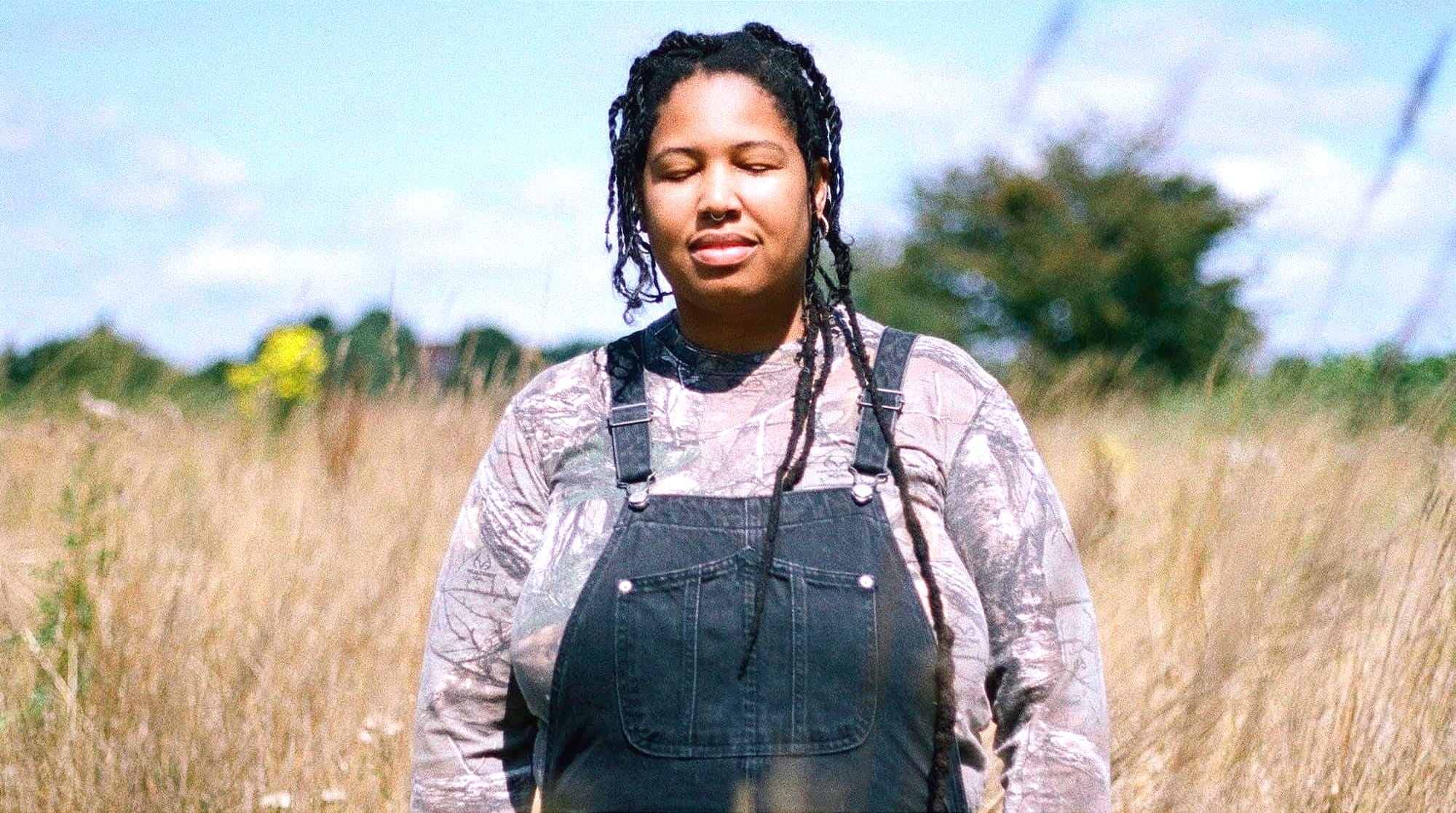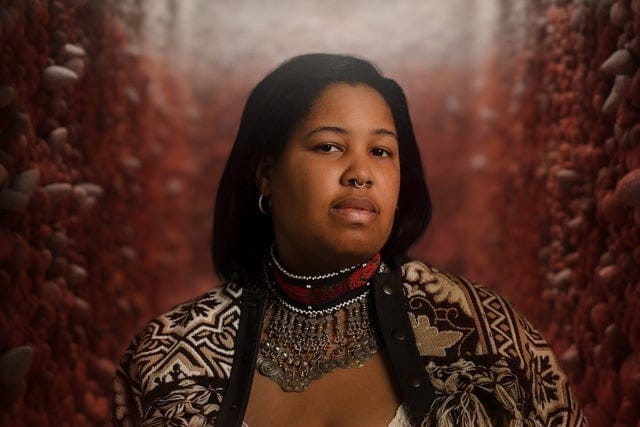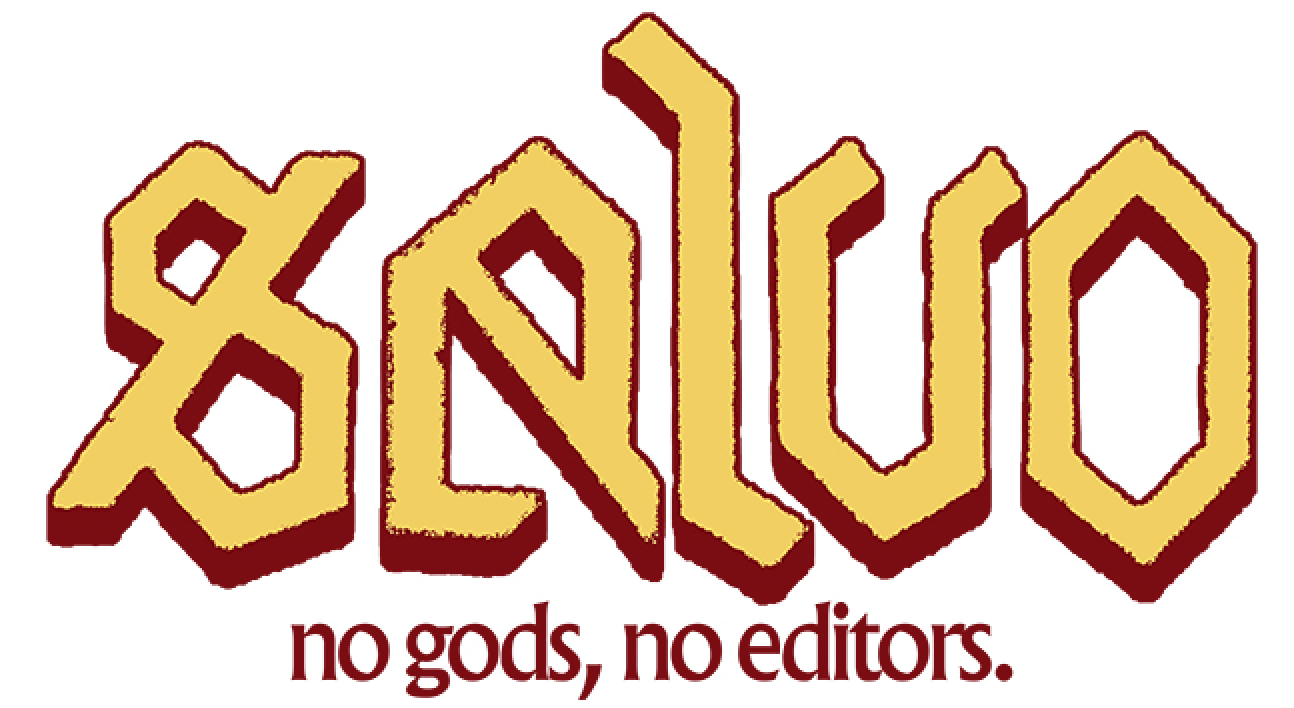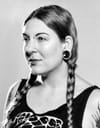Divide and Dissolve Still Dreams of Decolonization
Salvo interviews Takiaya Reed, the Melbourne-raised, Black and Cherokee multi-instrumentalist behind the political doom/drone project.

The world can really feel so very small sometimes. Last weekend, I finally got the chance to see an artist whose work I've been following for years—Takiaya Reed, the Texas-born, Melbourne-raised, Black and Cherokee multi-instrumentalist behind instrumental doom/drone project Divide and Dissolve. Her band (which is really just her, with a rotating cast of collaborators) was playing a small venue in Center City that sat atop a sporty bar filled with bros in Phillies jerseys, steps away from a fancy ice cream joint and just around the corner from my gym.
My dear sweet friends in Sunrot, North Jersey's finest purveyors of gloriously gay power sludge, were slated to open for Reed's ensemble. I was out by the dumpsters talking to a couple of the dudes when Takiaya herself appeared, wearing a camo top and a gently quizzical expression. I was a little bit late for our interview, and as we debated where to go to find a scrap of quiet, my partner popped up from around the side of Sunrot's van. As soon as she saw him, she laughed in recognition. He'd booked Divide and Dissolve at ABC No Rio years ago, and put her and her then-drummer up at his cramped punk house afterwards. As they caught up, amidst a tangle of limbs born in Texas and New Jersey and Brooklyn, I couldn't help but marvel at how heavy metal had collected us all from so many disparate places and deposited us here, on this dirty street, together.
Music—metal, and, I guess, otherwise—truly is a powerful thing. Takiaya understands this implicitly, and utilizes its many guises in her own sprawling compositions, whose wordless depths convey a deep, raw emotional force that's difficult to describe and even harder to resist.
Even after all these years of listening to music and hearing people talk about music and analyzing music, work like hers still seems like magic to me. With writing, my brain works in a way where I can just see how it's supposed to be, and feel how it's supposed to read—or at least, what makes the most sense to me. I always thought that that's how writing songs must feel to musicians, where they just kind of know how it's supposed to be... or, as I asked Takiaya, is that not it at all? She just flashed a Cheshire cat grin and said simply, "Yeah, that's like unlocking a mystery of the universe."
We eventually extricate ourselves from the chaos outside, made our way to the green room, and curled up on a couch to chat before soundcheck. (Unfortunately, there was no time to sneak down to Old City to pay a visit to some of Philly's own rancid old colonizers, Resistance"-style). Our conversation has been lightly edited for length and clarity (and giggles).
SALVO: Welcome to Philly! Tell me, what is going on with this current tour? What has brought you to this moment?
TAKIAYA REED: I am touring my album, Systemic, and we're playing a show at Milkboy. The venue is up the stairs, and when we turned on the bass amp, it was playing the radio, and I made a video of that, and I put it out into the Instagram ether. I wanted to know the scientific explanation of why, when you have speakers, you turn them on, and then sometimes it gives you music. How do those waves transmit to us? And what a beautiful opportunity that is. And I also really appreciate how radio waves travel in the world, and how they travel in outer space, and I oftentimes wonder how they travel through us, and how they intersect with the light.
Do you remember what song was playing or what kind of music it was?
It was classic dad rock, and I did not know which song it was, but it felt cool. I'm curious if it's going to be happening during my set, which I think it will, which is great.
Drummer Sylvie Nehill stepped down from D+D a few years ago, and you've been working with a variety of fill-in drummers since then. Who is playing with you on this tour?
I'm currently playing with Kwame Winfield, and she is amazing. I feel really blessed to play with her, and we just met recently. I was so excited to find out that she's also Black and Cherokee, like me, and we just really get along. Sometimes we're just sitting there in silence, because I know I can feel that she's like, thinking a lot. She seems so internal in this way, and I love this deep knowing she has. It's me, and then there's Riley, she's doing sound, and Marcus is our tour manager, and that's who's sitting in the van and making all of these decisions.
You're also working on a new record, right?
Yeah! Well, the record is done. And, oh, I am working on something actually, but my new record is coming out on Bella Union, and I'm really excited. We have a new single that was released, "Monolithic," and I feel really proud of it. I feel excited to share my insides to the outside.
It's got to be funny, when you have all this new stuff percolating, to be like, "Okay, I'm gonna go out and play songs I wrote years ago!" Is it sort of a strange feeling to bounce between the past and the future and the present with the music you're playing live?
The album cycle versus the touring cycle is a unique disposition. I appreciate it a lot, because it forces you to have appreciation for something that you put a lot of effort into, and something that's there and material, and people can listen to it and relate to it and think about it really hard, and you've had space from it, and then you can be reminded about what it's about, how it made you feel. And I really enjoy that process. I'm in appreciation of this manufactured dissonance. It's sometimes really cool, and sometimes I'm like, 'What's happening?' It makes me a little dizzy, but in a good way.
The world is arguably worse than it's been in a while. Systemic interrogates the, well, systems that are crushing most of us into dust, and that cause even deeper harm to some—Indigenous people, Black people, Palestinian people, and so many others. It's not the most hopeful message, but it's very truthful. Did you take a similar direction with the new material?
My new single off of my new album, it is about that hope and love. It's about how we make decisions, today in the present or in the past, that will influence the future, and hopefully these things will make things better. And sometimes you work towards something that you won't experience in this lifetime. I think about how older people will continue to remind me and my friends things were a lot harder when I was a child, or when my parents were children, or when their parents were children. Then we're getting into slavery, and you go back more and you're getting into these genocides. They're very close in our future and our past.
And for me, this music is about the hope and love that's required in order to make decisions that will impact the dispossession and the genocide that's happening and hopefully making things better for people. Sometimes that those feelings are so distant and far away and impossible, and I called it "Monolithic" because we are dealing with monolithic entities, where it's been posed as truth and unstoppable and unchangeable, but anything's possible, especially getting rid of subjectivity, of systemic oppression. So this is about holding on to that in a way that feels loving and filled with compassion.

Just like what Ursula Le Guin said about the divine right of kings—we thought that felt inescapable, too. You've always been very clear that Divide and Dissolve is about dismantling colonialism and genocide and white supremacy, and you're still trying to instill that hope in people. You've been doing this project for almost ten years now, and as you said, there's genocides happening around us all the time. I'm interested in how the political events of the last decade have impacted the way you approach it and what you put out there.
It feels tremendous. I never thought that when I played Berghain, we would be forced to project the Palestinian flag on the wall, and that the security guards that were hired by Berghain would be Nazis and would hurt my friend. I didn't know that that would be my first experience at Berghain; I thought it would be something different. And I didn't know we would be forced to have the stage covered in keffiyehs, and to take such a strong stance in Germany.
To me, it just feels like it's important to adapt, and it's important to proceed with fearlessness and to not focus on making money, because ultimately, when you take a stand, you make less money. You lose your jobs, you limit your possibilities for working in the context in which you may have grown accustomed to, and that's what standing up for people experiencing genocide or fighting for your people is in most contexts: you lose money, and you lose your ability to exist within the framework of capitalism, and then you try to keep going, And that's all that is.
People lose their lives, their livelihood, their ability to create movement in a space where movement was possible. And to me, I feel like holding on to that hope is paramount to success. We have to proceed with love and compassion and just really think that everything's going to be okay. Things are not okay, but things are okay for some people sometimes. We can shift responsibility, we can help one another out and be there for each other, and that's what's required in order to create a change that's necessary for everyone to live and to experience liberation and freedom.
What does success look like to you?
Discomfort. It's funny, I feel like that's an answer that depends on what time of day it is! It's a fluctuation. Success, essentially, is skewing and shifting the negative outcomes that are expected, where certain people are expected to die early because of something out of their control. When people's genetics stop being damaged because of the colonial project. When the prison population is 0%. When everyone is not hungry anymore, and everyone has a chance to be warm and fed.
There's so many ways that success can be measured. It feels very decolonial and measured in this way that's, like, unquantifiable. Success sounds like something and feels like something, and I'm having a hard time using words to describe it.
I really appreciate how measured and thoughtful you are in the way you approach these kinds of big questions. How have people's reactions to your band and your very unapologetic political stances shifted over the years? Have you found that people are more open and interested in what you're saying now, or have you had people shy away?
If I'm to generalize, most people are really supportive, and I appreciate that a lot. There is some pushback sometimes, but most of the time, people understand what free Palestine means, and they understand why white supremacy must end. And I think people when they look at me, they understand why I would want white supremacy to not exist, and why I want land back for indigenous people. I'm sure talking about this stuff is impactful. It impacts me.
People have had violent reactions to me before; people have screamed from the audience, a few things that have happened where it's been scary, but I do not want to be dominated by fear. There are so many prices that we pay, and sometimes not saying things has an impact. I don't want to live in that fear. Anything is possible. I could live a really long life. I could not.
But whatever I'm doing, I would like to know that I tried really hard and I did it with all my heart. It's a drop in the ocean, that's it, and I'm totally happy with that. I'm like, 'Cool, here's my one drop in the ocean. The water returns to the sky, and it falls back down, and there's all these cycles of life and water. Our bodies give out, and then they return to the earth. I'm just participating in a way that feels good for me.
Divide and Dissolve has really carved out a unique place for itself within the realm of heavy music; you're shapeshifters, you fit everywhere and nowhere. Tonight, you're playing with a rapper and a queer doom band. How do you flip the switch between heavy metal mode, noise mode, experimental progressive mode, and all the others?
I know the music's heavy, but I feel genreless. We get booked at so many different things all the time—fashion stuff, art stuff, classical music stuff.
I'm a classically trained musician, and I play lots of instruments. People can hear that in the music. They're like, 'Oh, but it sounds like—? ' Because it is! I'm really grateful that I have the ability to play different instruments, and I feel very comfortable in a classical music setting, or in many different settings. And I love composing.
How did you learn to do that?
My dad. My dad plays everything. If I'm half the musician that he is, that's completely acceptable, and I will just be happy.
My dad, he sat me down in front of a piano when I was like, three, put me on his lap, and was like, 'If you know how to play this instrument, you can play anything.' And then I was like, 'I'm really bad at this!' He then was like, 'Okay, you look like a saxophone player.' 'What? I want to play trombone.' 'No, saxophone.' Then when I picked up the saxophone— I know this is gonna sound ridiculous, but I felt like I knew how to play it immediately. I feel like I was really bad at saxophone for like, a few weeks, but I felt naturally connected to it, and then I just went from there. And I really love playing different instruments. I really love being able to create different sounds. I really love being able to be in a polyphonic setting versus a monophonic setting. Though to me that's very limited, perceiving music that way, monophonic versus polyphonic. What is a note? Like, what is one note versus two or three? All the tones are contain multitudes.
Sometimes I'm in this space where I'm like, 'What's a note? What is a scale?' I just like to be in my experience of resonance, and base everything in that way. That's a helpful framework for me, versus like monophonic versus polyphonic. It is nice to be able to easily access playing many different tones at the same time, and that's why piano is nice, or guitar, versus playing saxophone or flute or clarinet or whatever other instrument.
It sounds like a superpower.
More like, everything feels unlimited. For me, music is so cool, and can be played in so many different ways.
It's taken you awfully far outside of Australia, too, which is a massive accomplishment in and of itself.
I've never been interested in only staying in Australia. Just only touring in Australia doesn't work, you have to fly to every single show. But there's people making really incredible music there. My friend Fjorn, she is in this project called Papaphilia; it's really heavy. There are people that I've met there making phenomenal contributions to music, and I have friends there who are in bands I just absolutely adore. My favorite heavy musician's name is Karina Utomo, and she used to be in this band called High Tension [in Melbourne]. Personally, I wanted to play music in other places because it's really fun!
It's a big world, and fortunately (or unfortunately) your message resonates pretty much everywhere.
It's really hard to leave. It's challenging. But I got some cool opportunities to tour other places and play music festivals, and so I did that, and I'm gonna keep doing it.
You're doing it right now!
I'm so happy. I feel so lucky.
+
Stream "Monolithic" now, keep your ears open for news about Divide and Dissolve's upcoming new album, and subscribe to Salvo! Free Palestine, land back, free 'em all!

